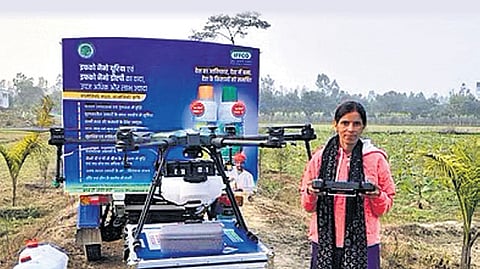

UTTAR PRADESH: Be it Sunita from Sitapur or Devki Rajput from Mainpuri, they stand as harbingers of change and ambassadors of an impending revolution set to sweep the rural enclaves of UP. They are among the ninety village women selected to assume the role of ‘Drone Pilots.’
Just a few years ago, the notion of women from villages becoming drone pilots, affectionately known as Drone Didis, seemed unfathomable. Yet, today, it is a reality.
Drone technology, once an alien concept for these women, has now become manageable, as they proudly share their status as among the first in Uttar Pradesh to become “drone didis.” This transformation followed their enrollment in a special training program known as the Pradhan Mantri Drone Didi Scheme.
This ambitious initiative seeks to train rural women to become drone pilots for agricultural purposes, thereby enhancing their economic empowerment and financial independence, particularly in rural settings. The rural regions are abuzz with talks of the Namo Drone Didi programme, hailed as a true testament to empowerment. The program’s goal is to equip 15,000 women-led self-help groups (SHGs) with agricultural drones to assist in tasks such as crop monitoring, spraying fertilizers, and sowing seeds.
Sunita and Devki are among the ninety women from UP, all members of different self-help groups, chosen for drone flying training. Overall, one thousand women are receiving this training under the Namo Drone Didis programme across twenty-two states of India.
Drone manufacturing units based in Tamil Nadu and Telangana have been incorporated into the program to extend drone technology to rural women. This effort aims to empower them to overcome barriers in traditionally male-dominated sectors such as agriculture and aerospace.
Remarkably, Sunita had the chance to exhibit her newly acquired skills during the 110th episode of PM Narendra Modi’s Mann ki Baat on February 25 of this year, while Devki and others showcased their drone-flying prowess at a grand ‘Sashakt Nari, Viksit Bharat’ event in Motihari, Bihar, on March 11, with the Prime Minister attending virtually.
The scheme garnered widespread attention after PM Narendra Modi conversed with Sunita Devi, inquiring about her drone experiences, which aided her husband’s farming efforts. In her discussion with the Prime Minister, Sunita emphasized the revolutionary impact of drone technology on farming, technological advancements, and agricultural practices.
Sunita, holding a bachelor’s degree in Arts and leading a family of four, underwent drone technology training at an IFFCO unit in Phulpur, Prayagraj. Her first interaction with the technology occurred at the Sitapur Agriculture Science Centre, where, initially overwhelmed by its size, she feared the drone might lift her off the ground. Yet, Sunita is now a confident drone flyer, having mastered the skill after a fifteen-day training session with experts.
With farming as her family’s primary occupation, Sunita highlights how drones can address farming challenges, especially during adverse weather like rain. She shares her success in using the technology to spray pesticide across 35 acres of land. She points to the technology’s warm reception among fellow farmers, noting its revolutionary effect in saving time during farming practices.
Santosh, Sunita’s husband, asserts that she is not only aiding hundreds of farmers with drone services for daily farming tasks but also enhancing the family’s income.
Similarly, Devki, having trained in drone flying and its application in farming, has set aside her aspirations of becoming a school teacher. Instead, she is determined to excel in drone flying under the ‘Namo Drone Didi’ initiative, seeing it as a viable way to earn a living. She observes that drones can effectively replace labor-intensive tasks like spraying fertilizers or sowing seeds, offering a time and cost-efficient solution. According to her, a drone can carry approximately ten liters of liquid fertilizer at a time and cover an acre of land in just five minutes.